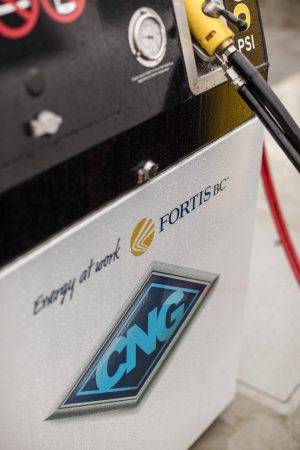
Thirteen transportation organizations in BC hit the brakes on diesel
by CM Staff

Switching gears to FortisBC's natural gas drives down costs and accelerates emissions reductions

A FortisBC compressed natural gas fuelling dispenser. (FortisBC)
SURREY, BC — Thirteen commercial transportation organizations in British Columbia (BC) continued to progress on their business and climate action goals this year despite the hurdles presented by the COVID-19 pandemic. These companies have adopted a combined 144 vehicles fuelled by FortisBC’s natural gas in 2020.
“BC’s commercial transportation sector accounts for around 40% of the province’s total greenhouse gas emissions each year, so it’s a significant area of opportunity for us to reduce emissions quickly,” said Sarah Smith, director of NGT, regional LNG and Renewable Gases with FortisBC, in a prepared statement. “I’m so proud to see these organizations, many of them staple names in their respective industries, taking significant climate action amidst this pandemic.”
The majority of these new natural gas vehicles are now fuelled by compressed natural gas, which reduces greenhouse gas emissions by up to 25% compared to diesel fuel. In total, these organizations are expected to reduce more than 2,000 tonnes of carbon dioxide equivalent in emissions annually, about the same as removing just over 430 gasoline-fuelled passenger vehicles off BC roads each year. These adoptions also come with financial benefits, as these organizations are expected to save up to 45% in fuel costs each year. In addition, FortisBC provides incentives to reduce the initial financial commitments associated with adopting natural gas vehicles — in 2020 alone FortisBC provided almost $2.3 million dollars in vehicle capital incentives to customers.
“There are over 900 natural gas vehicles on BC roads today, and natural gas, from compressed and liquefied to Renewable Gas, can make meaningful emission reductions immediately,” said Smith. “But clearly the value extends deeper than that. Adopting these vehicles is also easier on your wallets and we’ll provide incentives to help the transition.”